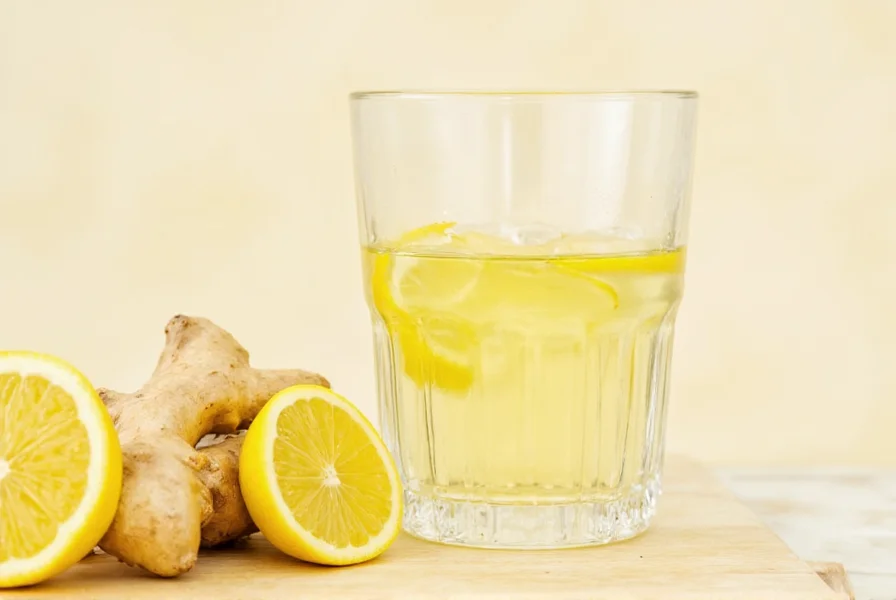Ginger lemon water has gained popularity as a simple wellness beverage, but what do scientific studies actually say about its health effects? This evidence-based analysis separates proven benefits from popular myths, helping you make informed decisions about incorporating this refreshing drink into your daily routine.
Scientifically Supported Health Benefits
Ginger contains bioactive compounds like gingerol that have demonstrated physiological effects in clinical research. Lemon contributes vitamin C and other phytonutrients. When combined in water, they create a beverage with several evidence-supported advantages:
Digestive Health Improvement
Ginger has been extensively studied for its positive effects on digestion. Research published in Food Science & Nutrition confirms ginger stimulates saliva, bile, and gastric enzyme production, aiding food breakdown. A clinical trial involving 120 participants found ginger supplementation significantly reduced symptoms of indigestion compared to placebo. The citric acid in lemon may further support digestive processes by promoting healthy stomach acid levels.
| Benefit | Scientific Support Level | Key Research Findings |
|---|---|---|
| Nausea relief | Strong | Ginger reduces pregnancy-related and chemotherapy-induced nausea |
| Digestive stimulation | Moderate | Increases gastric motility and enzyme production |
| Anti-inflammatory effects | Moderate | Gingerol compounds reduce inflammatory markers |
| Immune support | Limited | Vitamin C contributes to immune function; ginger has antimicrobial properties |
Nausea and Motion Sickness Reduction
Multiple studies validate ginger's effectiveness against nausea. A systematic review in Obstetrics & Gynecology concluded ginger significantly reduces pregnancy-related nausea. Research in The American Journal of Obstetrics and Gynecology found 1.5 grams of ginger daily reduced nausea severity by 31% compared to placebo. The mechanism appears to involve ginger's influence on serotonin receptors and gastric motility.
Anti-Inflammatory Properties
Ginger's gingerol compounds demonstrate anti-inflammatory effects in laboratory studies. Research in Journal of Medicinal Food showed ginger extract reduced inflammatory markers in participants with osteoarthritis. While drinking ginger water provides lower concentrations than therapeutic doses used in studies, regular consumption may contribute to overall inflammation management as part of a comprehensive approach.
Benefits with Limited Scientific Evidence
Many popular claims about ginger lemon water exceed current scientific evidence. Understanding these distinctions prevents unrealistic expectations:
Weight Loss Effects
While some websites promote ginger lemon water as a weight loss solution, evidence is minimal. A study in Metabolism found ginger supplementation slightly increased thermogenesis, but the effect from drinking ginger water is likely negligible. Any weight management benefits probably stem from replacing sugary beverages with this zero-calorie alternative rather than metabolic changes from the ingredients themselves.
"Detoxification" Claims
The concept of "detoxing" with ginger lemon water lacks scientific basis. Your liver and kidneys naturally detoxify your body. While staying hydrated supports these organs' function, no evidence suggests ginger lemon water enhances natural detoxification beyond what plain water provides. This represents a common marketing exaggeration in wellness circles.
How to Prepare Effective Ginger Lemon Water
Maximize potential benefits with proper preparation techniques:
Basic Recipe for Optimal Benefits
- 1-2 inches fresh ginger root, peeled and thinly sliced or grated
- ½ fresh lemon, sliced or juiced
- 8-12 ounces hot (not boiling) water
- Steep for 5-10 minutes for optimal compound extraction
Using fresh ingredients rather than powders preserves active compounds. Hot water (around 80°C/176°F) extracts more gingerol than cold water without degrading heat-sensitive compounds.

Timing for Maximum Benefit
Consuming ginger lemon water:
- Morning: May support digestion throughout the day and provide hydration after sleep
- Before meals: Can stimulate digestive enzymes (consume 15-20 minutes prior)
- When experiencing nausea: Sip slowly during episodes for potential relief
Safety Considerations and Potential Side Effects
Ginger lemon water is generally safe for most people but consider these factors:
Who Should Exercise Caution
- Individuals taking blood thinners (ginger may increase bleeding risk)
- People with gallstone disease (ginger may increase bile production)
- Those with gastroesophageal reflux disease (GERD) may experience worsened symptoms
- Pregnant women should consult doctors about appropriate ginger amounts
Recommended Consumption Amounts
For general wellness, 1-2 cups daily provides potential benefits without risk. Therapeutic doses used in nausea studies typically range from 1-1.5 grams of ginger daily, equivalent to about 1 inch of fresh ginger root. Excessive consumption (more than 4 grams of ginger daily) may cause heartburn or mouth irritation.

Realistic Expectations for Ginger Lemon Water Benefits
Ginger lemon water serves as a healthy hydration option with modest, evidence-supported benefits primarily related to digestion and nausea relief. It should be viewed as a complementary wellness practice rather than a treatment for medical conditions. The most significant benefits come from consistent consumption as part of an overall healthy lifestyle, not from expecting dramatic results from occasional use.
When prepared properly with fresh ingredients, this simple beverage provides hydration plus bioactive compounds that may support digestive health and provide antioxidant benefits. Manage expectations by recognizing that while ginger has demonstrated physiological effects in research settings, the concentrations in a typical serving of ginger lemon water are considerably lower than therapeutic doses used in clinical studies.











 浙公网安备
33010002000092号
浙公网安备
33010002000092号 浙B2-20120091-4
浙B2-20120091-4